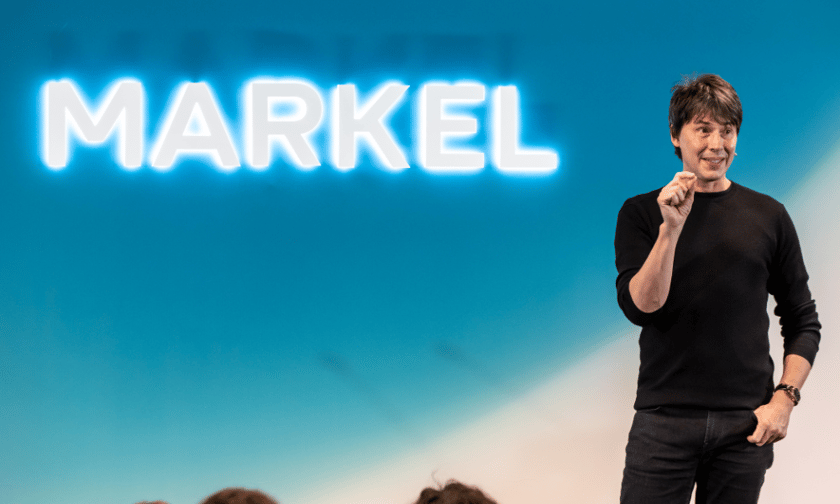

If insurance and science have one thing in common, it would surely be that the outside world generally sees both as dull and boring despite the fact that those within each sector would highlight how fascinating and varied they can be.
Now you can add another commonality: Professor Brian Cox (pictured).
Dubbed by the man himself as David Attenborough’s natural successor, Cox has earned plaudits for making science interesting again – finding unique ways to make the most complex subjects understandable. Famed for TV shows including Why Does E=MC²?, Solar System and Brian Cox’s Adventures in Space and Time, the CBE awardee recently graced the insurance sector with his presence, appearing at a Markel Tech event.
Taking questions from brokers on everything from UFOs to solar flares, Cox, who offered attendees a signed copy of his new book Black Holes: The Key to Understanding the Universe, suggested that tech and space could actually become the same thing - creating a new, complex supply chain risk for brokers and underwriters to get their heads around.
“The separation between tech and space is false,” he said. “In fact, someone suggested to me that space should just be considered an extension of the economy. A lot of the tech that tech companies are building might end up being crafted with a higher purity in micro gravity. In not too long, people may look at space stations and other areas for technology – some of these products will be developed in space.”
Cox highlighted that, for now, rocket launches appear to be high risk from an insurance perspective – but once the infrastructure is in place in space, they could ultimately be no riskier than anything else. “Once you’ve got this in-orbit infrastructure – which is coming,” he said, “the investment risk is no higher than investing in a ground-based tech company. That economy is growing faster than many of us expected.”
Cox quoted a chat with Amazon founder Jeff Bezos who told him that all he needed to build the shopping giant was two pieces of infrastructure – the internet, and the postal service. Given those he was able to grow a company quickly. Now, Bezos’s goal, Cox claimed, is to do the same again – to put the infrastructure in place so that entrepreneurs and companies can function beyond Earth.
Few insurance conversations these days can escape talk about cyber risk – and Cox’s appearance was no exception. One audience member quizzed the Professor on the possibility of cyberattacks being launched by nations to halt the progress of rocket launches and asked him if he was aware of such activities. Drawing laughs from the audience, Cox responded that he wasn’t, and if he was, he probably wouldn’t be able to tell them anyway.
“But, it’s interesting,” Cox continued. “Rocket launches are quite local things – they are quite autonomous. It’s almost routine now, so I’m not sure how easy it would be to disrupt a rocket launch.”
Still, while he may have dismissed one potential risk avenue, Cox did present another – the possibility of air traffic control in space. “One thing that is worrying people now is air traffic control in space – because we don’t have it. What happens if there’s debris, who is responsible for it? What happens if you want to move it? So we want to make space more structured – but that, in turn, may open it up to more risks like cyberattacks.”
Cox also had time to potentially solve one of insurance’s biggest issues: geopolitical risk. While talking about whether or not other planets could potentially support life, Cox noted that there are likely to be many planets, solar systems and moons with that potential – and for humans, both the Moon and Mars are among them.
Referencing the space exploration efforts of Bezos and Elon Musk, Cox noted that their motivations are unlikely to be economic and instead may be about human colonisation. He noted that Robert Zubrin, aeronautical engineer and author, noted for a close relationship with Musk, once said that “the worst idea in human history is that we have access to limited resources.” He believes that war is fought based on that premise – but in actuality, it’s false. Beyond Earth there are, in fact, unlimited resources.
So the cause of conflicts are not that resources are limited – but that humans believe they are. Now if someone could just get that message across to the world’s leaders, perhaps Brian Cox, with a little help from Zubrin, could add solving geopolitical risk to his extensive resume.
To find out more about the Markel Tech proposition follow this link.
